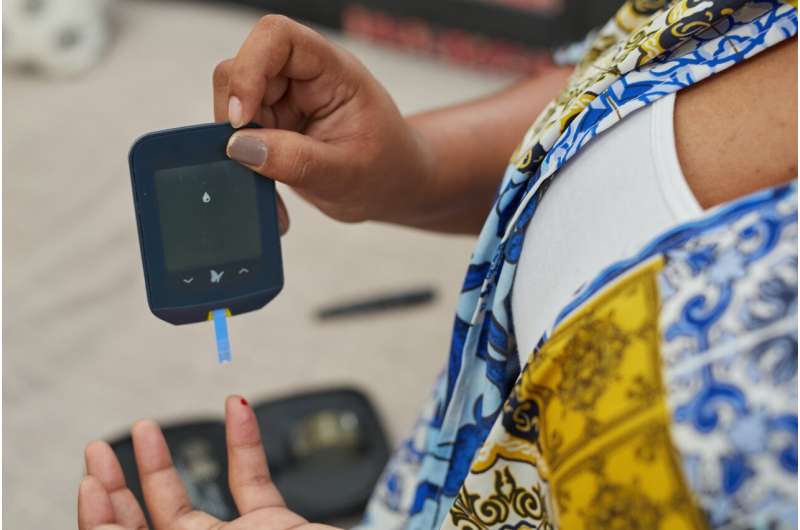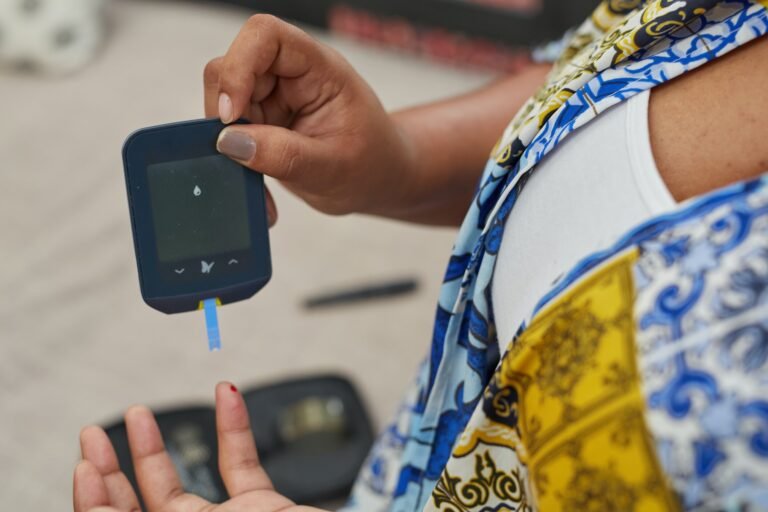
Credit: Unsplash/CC0 Public Domain
Laura Saslow, an associate professor at the University of Michigan School of Nursing, has been studying the effects of different dietary patterns on type 2 diabetes for over a decade.
Saslow reviewed extensive clinical trial evidence on remission and reversal of type 2 diabetes with various dietary approaches and found that both low-calorie liquid diets and very-low-carbohydrate ketogenic diets can induce remission or reversal of type 2 diabetes and reduce or eliminate the need for medication.
She explains what has worked for her diabetic patients and what hasn’t.
What is Type 2 Diabetes?
Type 2 diabetes develops from two problems: cells become resistant to insulin and can no longer absorb enough sugar, and the pancreas can no longer produce enough insulin to maintain normal blood sugar levels.
Insulin, a hormone secreted by the pancreas, promotes the uptake of blood glucose into cells, lowering blood glucose levels and reducing sugar concentrations in the bloodstream. In type 2 diabetes, this system malfunctions, impairing insulin function and production, leading to chronically high blood glucose levels and an increased risk of vascular damage and other complications.
What were the main findings of the trials of very low calorie diets for diabetes remission?
In the Diabetes Remission Clinical Trial, around 300 people in the UK chose to be in a control group or to follow a very low-calorie liquid diet (around 850 calories) for around three months. The low-calorie group stopped taking their diabetes and high blood pressure medications at the start, and after around three months they slowly resumed their normal diet and were supported to maintain their weight loss.
After one year, 46% of people in the low-calorie group were in remission, and after two years, 36% remained in remission. Only 2% to 4% of people in the control group were in remission.
What were the main findings of the Indiana University trial of a very low-carb ketogenic diet to reverse or remit diabetes?
In the Indiana University trial led by Sarah Hallberg, about 350 people chose to follow standard treatment for diabetes or a very low-carb ketogenic diet, also known as the keto diet. Following the keto diet means consuming very few carbohydrates, about 20-35 grams of non-fiber carbohydrates per day, to reach a state called ketosis, in which the body switches from glucose to fat as its primary source of energy.
This helps control blood sugar levels by reducing the amount of carbohydrates that cause blood sugar spikes.This diet allows you to include low-carb, high-fat foods such as beef, pork, chicken, fish, seafood, high-fat cheeses, avocados, and low-carb vegetables such as spinach, eggplant, cucumber, zucchini, bell peppers, broccoli, and cauliflower.
People who follow this diet can replace high-carb wheat flour with almond flour or coconut flour and include healthy fats like olive oil, butter, and coconut oil. They avoid grains, sugar, and most fruit to maintain stable, low blood sugar levels.
An Indiana University study found that people on the keto diet saw a significant decrease in medication use: About 60% of people who used insulin no longer needed it at all.
Medication use decreased significantly in the keto group, while medication use remained stable or increased in the control group. Overall, 47% of people on the keto diet were in remission or recovery after one year, and 38% were in remission or recovery after two years. In the control group, 7-10% were in remission or recovery after 1-2 years.
Are there any new dietary approaches that might help put diabetes into remission?
Yes, the combination of continuous glucose monitoring and advice is promising: a study from India found that 63% of people who received advice based on continuous glucose monitoring achieved remission after one year, compared with none in the control group.
Dietary advice focused on eating more vegetables and protein, and people were to cut their carbohydrate intake in half, on average, to about 150 grams per day — an approach that this and other studies suggest could be effective in managing type 2 diabetes.
Which diets and interventions are least effective at putting diabetes into remission?
Low-calorie, low-fat diets and the Mediterranean diet have shown low remission rates. For example, in the Look AHEAD trial, a low-calorie, low-fat diet had only an 11% remission rate after one year. Similarly, a study of the Mediterranean diet had only a 14% remission rate after one year. Other diets, such as vegan, vegetarian, and DASH diets, have very limited and low-quality clinical trial evidence for remission or reversal of type 2 diabetes.
How common is type 2 diabetes in the United States?
About 15% of American adults have diabetes, most of which is type 2 diabetes. Additionally, one-third of adults have prediabetes, meaning half of American adults have either prediabetes or type 2 diabetes. It is also very costly, costing about $413 billion each year. People with diabetes account for one-quarter of all healthcare costs in the United States.
What do “remission” and “recovery” mean for people with type 2 diabetes?
Remission means that blood glucose levels remain below the diabetic range for at least three months without the use of any diabetes medications. Recovery means that blood glucose levels remain below the diabetic range without the use of any diabetes medications or with only the use of metformin, a common diabetes medication. Remission or recovery is relatively rare.
In a study of 122,781 people in the United States, only 1.6% of participants experienced remission over seven years. For people who had been diagnosed with type 2 diabetes for less than two years, the chance of remission rose to 4.6%.
What dietary studies have you looked at?
I looked at every randomized or non-randomized dietary clinical trial I could find that had at least 50 participants in each group and was followed for at least a year.
Where can I find resources on type 2 diabetes meal plans?
The University of Michigan offers a very low calorie program, and the University of Michigan also offers a weight navigation program that supports a very low carb ketogenic diet approach.
Online resources about the ketogenic diet include Diet Doctor, Low Carb Program, Virta Health, and Low Carb Jumpstart from the Michigan Collaborative for Type 2 Diabetes. Cookbooks: The Wholesome Yum Easy Keto Cookbook, The Everyday Ketogenic Kitchen, and The Easy 5-Ingredient Ketogenic Diet Cookbook.
Because a ketogenic diet can lower blood sugar and blood pressure, for example, doctors may need to reduce medications for these diseases because there is a risk of dangerously low blood sugar. For more information, see Diet Doctor or the Michigan Collaborative for type 2 Diabetes. Saslow’s review of clinical trial evidence on diet for type 2 diabetes is being made available online for free this year as part of the Sarah Hallberg Legacy Course, produced in honor of the late physician-researcher Hallberg, who led a key clinical trial on diabetes reversal. Hallberg’s TEDx talk on reversing diabetes by reducing carbohydrates has been viewed more than 11 million times.
Courtesy of University of Michigan
Quote: Q&A: Liquid low-calorie or low-carb keto diet could reverse type 2 diabetes, study shows (June 17, 2024) Retrieved June 17, 2024 from https://medicalxpress.com/news/2024-06-qa-liquid-calorie-carb-keto.html
This document is subject to copyright. It may not be reproduced without written permission, except for fair dealing for the purposes of personal study or research. The content is provided for informational purposes only.


